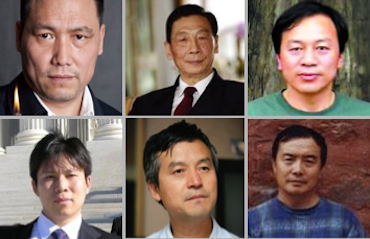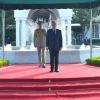A Citizen Proposition: Calling for Immediate Ratification of the International Covenant on Civil and Political Rights by the NPC
To the Standing Committee of the National People’s Congress:
On the eve of the opening of the 12th National People’s Congress of the People’s Republic of China, as China’s new government prepares to take the stage, we solemnly and openly propose the following as citizens of China: that the International Covenant on Civil and Political Rights be ratified, in order to further promote and establish the principles of human rights and constitutionalism in China. Our concrete reasons are as follows:
1. The International Bill of Human Rights, as the basic declaration, establishment and standardization of basic human rights principles, accords with the tenets of national establishment and constitutionalism that the Chinese government and the Chinese Communist Party have always emphasized.
Together, the Universal Declaration of Human Rights (UDHR), the International Covenant on Economic, Social and Cultural Rights, and the International Covenant on Civil and Political Rights, which together form the main structure of the International Bill of Human Rights, have become the core principles of human rights protection for the international community. Among these, the International Covenant on Civil and Political Rights is regarded as “the most authoritative expression of the most basic human rights standards generally accepted today.” The various basic human rights formulated in this treaty, as the first generation of human rights, are of fundamental importance. Since the end of the 18th century, these rights, as precious institutional fruits of humanity’s modern constitutional revolution, have become basic and indispensable provisions for the constitutions made by the vast majority of nations and peoples – they represent humanity’s universal appeal for rights, freedom and dignity.
The values and solicitude promoted by the International Bill of Human Rights have also been declared continuously by the government of China and by the Chinese Communist Party, and are the goals and tenets upon which the nation was founded and constitutionalism established. Before the founding of the People’s Republic of China, the Chinese Communist Party issued an appeal to “fight for human rights and freedom,” and this was entered into documents of a constitutional nature, including Draft Constitution for the Constitution of the Soviet Republic of China (中华苏维埃共和国宪法大纲) and Administrative Program for the Shaanxi, Gansu and Ningxia Region (陕甘宁边区施政纲领), and for this purpose a whole series of ordinances were promulgated in Communist Party-controlled areas in order to guarantee [these principles]. In the constitutional movement that seized the entire country in the 1940s, the Chinese Communist Party also was a principal promoter [of these values], and human rights protection was one of the essential issues. After the founding of the People’s Republic of China, the 1954 Constitution included a special clause stipulating the “basic rights and responsibilities of citizens,” and this established the basic tone of our country’s constitution, with a foundational role for human rights. While [China] afterwards suffered many turns and setbacks, and paid a steep price on the issues of constitutionalism and human rights protection, the great goal of [establishing] human rights has already become a core agenda inseparable from the project of [national] transition in which we are presently engaged. This can be seen most recently in the second human rights plan formulated by our country, the National Human Rights Action Plan (2012-2015).
2. Immediate ratification of the International Covenant on Civil and Political Rights will honor the solemn pledge of the Chinese government, satisfy the fondest hopes of the Chinese people, and demonstrate China’s commitment to be a responsible world power.
When the United Nations passed the International Covenant on Economic, Social and Cultural Rights and the International Covenant on Civil and Political Rights in 1966, it called on all nations to see both treaties as part of a whole, signing and ratifying both together. As of November 1, 2010, 167 of the 193 United Nations member countries had formally joined the International Covenant on Civil and Political Rights. In 2001, China ratified the International Covenant on Economic, Social and Cultural Rights, which has been referred to as the “second generation of human rights.” But today, 15 years after our country signed the International Covenant on Civil and Political Rights in 1998, it has still not ratified this treaty, which is regarded as the “first generation of human rights.” China’s government has placed its emphasis on the gradual improvement of China’s existing legal system in advance of ratification, so that it can accommodate the demands and various responsibilities of the treaty. However, the gap between the signing of human rights treaties and their ratification must still be kept within the realm of reason, in order to promote further progress on civil rights and political rights, and in order to avoid unnecessary conjecture from the international community.
As a Permanent Member of the United Nations Security Council, China has always been an active initiator and participant in the International Bill of Human Rights. China’s government played an important role in the formulation of the Universal Declaration of Human Rights (UDHR). International human rights standards are therefore not imported products but in fact include the achievements of Chinese culture and the Chinese people. The signing of the International Covenant on Civil and Political Rights 15 years ago demonstrated even more our country’s serious commitment to the protection of basic human rights as a responsible world power. Afterwards, both President Hu Jintao and Premier Wen Jiabao said openly on numerous occasions both at home and overseas that China would immediately take the legal steps to ratify the treaty once the conditions were right. In the beginning of 2008, more than 10,000 Chinese citizens signed a call for the ratification of the International Covenant on Civil and Political Rights. And so there is no longer any need to vacillate. In order to adapt to trends in human rights development, live up to our government’s pledges and answer the demands of the people, in order to behave in a manner consistent with a major power, we must join the treaty without hesitation, with a positive and decisive attitude.
3. Since China signed the International Covenant on Civil and Political Rights, the country’s reform and opening process has deepened, its building of rule of law has advanced, a general rights awareness has awakened, and a civil society is developing – the time is right for China to ratify the treaty.
In 2011, China released its White Paper on the Socialism With Chinese Characteristics Legal System (中国特色社会主义法律体系), declaring that a complete, scientific [or “rational”], harmonious and unified legal system of socialism with Chinese characteristics had already been achieved [in China] under the command of the Constitution. Especially deserving of mention is the fact that in 2004 the language “our nation respects and guarantees human rights” was added to the Constitution, so that the protection of human rights was elevated to a constitutional principle. In 2013, the newly amended Criminal Law (刑事诉讼法) took effect, introducing many stipulations in line with the spirit of modern human rights and rule of law – for example, the exclusion of illegal evidence, the improvement of procedures for reviewing capital punishment cases, the right against self-incrimination, the expansion of lawyers’ rights, stricter procedures for the arrest of suspects, etcetera. At the National Politics and Law Work Teleconference held at the beginning of this year, it was clearly emphasized that a people-based [approach], justice and fairness were to be taken as the heart and soul of rule of law development. Moreover, there was specific mention of the further advancement of reforms to the re-education through labor system, legal and petitioning work (涉法涉诉信访工作), the operating mechanisms of judicial power (司法权力运行机制) and the household registration system (户籍制度). It can be said that the building of rule of law in our country over the past 30 years has moved steadily in the direction of human rights, and the results we have achieved are entirely the natural and logical result of overall social progress. The expansion of civil rights and the elevation of the political status [of citizens] has also, objectively speaking, created favorable conditions for the ratification of the International Covenant on Civil and Political Rights.
It cannot be denied that there remains a substantial gap between the requirements of international human rights treaties and the situation in China with respect to human rights and rule of law. But when we speak of the right moment, this has never meant that everything is as ready as it could possibly be, or that perfection has been achieved; it means that we have made full preparations for the protection and advancement of human rights, that we have provided a stable foundation making it possible to join up [with the requirements as stipulated in international treaties].
Human rights work is dynamic and diverse, and the proper space and mechanisms for constructive interaction must be created between the domestic and the international spheres, between government and society, between the present and future, between the particular and the general. In this respect, now is the best time for our country to ratify the treaty. As for remaining difficulties or inadequacies in China’s present legal system that may require time to address, we can do as other countries have routinely done in ratifying the treaty; we can make appropriate compromises (保留), issue statements, notices or opposition/demurs (?). But we must be sincere, serious and deliberate, showing the utmost respect for the sacred and long-lasting nature of human rights work.
4. Ratifying the International Covenant on Civil and Political Rights would be a constructive step toward renewing. . . safeguarding the life and authority of the Constitution.
In his speech commemorating the 30th anniversary of the promulgation of the current Constitution, Mr. Xi Jinping said: “The life of the Constitution is in its actualization; the authority of the Constitution is in its actualization.” These words profoundly express the basic governing idea of a “constitutional China” (宪行中国). A number of the more favourable clauses in our current Constitution are intrinsically consistent with the basic principles and spirit of the International Covenant on Civil and Political Rights. The critical factor in ensuring that these favourable clauses truly become authoritative signs for the fashioning of the national spirit, for the consolidation of political consensus and the realisation of a revival of civilisation, is the taking seriously of civil rights and the implementation of the Constitution — and to this end we must actively seek [to create] pluralistic mechanisms for the implementation of the Constitution.
From the constitutional experiences of various nations we can see that these implementation mechanisms largely comprise systems of constitutional interpretation (释宪机制), mechanisms for constitutional review (违宪审查机制), mechanisms for the judicial [application] of the constitution (宪法司法化机制), constitutional supervisory mechanisms (宪法监督机制) and mechanisms for the direct application of constitutional clauses (宪法条款直接适用机制). In our country at present, all of these mechanisms exist only on paper — they must be given real force through more concrete and workable constitutional practices.
Ratifying the the International Covenant on Civil and Political Rights would in fact be a feasible step toward the innovation of multiple constitutional implementation mechanisms. First of all, this treaty itself emphasises the use of measures to check the government and limit public power in order to reach the goal of respecting and protecting human rights, and these can indirectly help to lay the foundation for popular sovereignty and models of checking and balancing power, thereby improving the governing ideas and governing capacity of the government. Next, through the process of implementation of the International Bill of Rights, a rich and normalised body of experience has been accumulated in terms of rule of law for human rights protection. This includes reporting procedures for treaty parties, procedures for petition by nations or individuals, stipulations concerning monitoring and encouragement of the legislative and judicial authorities in various [party] nations to apply remedial measures for human rights [protection], etcetera. These assist treaty party nations in fulfilling their human rights pledges, and enable deep and far-reaching reforms and improvements to constitutional structures. Third, as the United Nations Human Rights Council monitors the implementation of the human rights treaties, it respects the autonomy and the constitutions of various nations. This takes shape primarily through the promotion of consensus and on the basis of constructive dialogue and cooperation. Imperceptibly, this provides a model of requisite autonomy, rationality, respect, tolerance and other prerequisites in the process of constitutional implementation in various countries.
5. Ratification of the International Covenant on Civil and Political Rights at the earliest possible date could prompt our country to deal more candidly, openly and unequivocally with the supreme principles of human rights and constitutionalism, realising the great mission of the rejuvenation of the Chinese nation.
The standards and experience of the International Bill of Rights on human rights continue to show that these basic human rights are universal (普遍性), equal (平等性), inalienable (不可分割性) and interdependent (相互依赖性). For a China which at present is working to realise the great mission of the rejuvenation of the Chinese nation this is of particular significance. Among our myriad priorities, human rights is paramount. The goal is human rights, and political power must serve human rights, for human rights are the origin of legitimacy (保障人权始有合法性). The principles of human rights and constitutionalism should therefore become an overarching consensus in Chinese society. In fact, human rights and constitutionalism are inherently connected, just as explicated by Mr. Xi Jinping: “Only by ensuring that all citizens are equal before the law, by respecting and protecting human rights, by ensuring that the people enjoy broad rights and freedom according to the law, only then can the Constitution enter deep in the people’s hearts, only then can it move among the masses, and only then can the implementation of the Constitution truly become a conscious action on the part of all the people.” We worry that — as we [as a society] lack a proper sense of human rights, and as we lack basic protections for personal freedom, rights and dignity — our entire society risks sliding into [a chaos of] hatred and violence, moving toward separatism and hostile division, in the event that we face a comprehensive crisis. We worry that — as we lack proper knowledge of constitutionalism, as we lack the most basic understanding and faith in the sanctity and authority of constitutionalism — our country might give way to an instrumentalism (工具主义) [that sees politics only as a means to an end], that our leaders will find it difficult to establish a set of values that accord with modern civilisation, and that they will then forfeit all governing legitimacy and all necessary dignity.
In summary, for citizens and the government, for our nation and peoples, the establishment of a nation of human rights, of a China in which constitutionalism is in force, this is the only true and fundamental measure of the gloriousness of our achievements and of our dreams [CHECK]. We must foster a civil society rooted in fairness, peace, rationality and openness, and we must build a decent politics founded on love and justice. The establishment of human rights in our country and the achievement of constitutionalism are principles representing our most sincere and well-intentioned hopes, and they express our profound concern for personal fortunes, community welfare, national honor and [the fruits of] human civilization. We remain confident that if people can become the foundation [of our country] in practice, and if the constitution can guarantee their dignity (以宪为尊), we can promote harmony in our society today, and we can achieve national strength and prosperity for China’s future at the lowest possible cost. We also believe that if we work with human rights and constitutionalism in China as our direction, focus and point of entry, and if we proceed with determination and belief, remaining tenacious and meticulous [in our work], there are no difficulties concerning the development of our nation and peoples that cannot be resolved. In this way, each individual person would benefit, our nation as a whole would benefit, and all the peoples of our country would benefit.
For these reasons, we call on the State Council to submit a proposal to the 12th National People’s Congress concerning the ratification of the International Covenant on Civil and Political Rights, in accordance with Article 89 of the Constitution of the People’s Republic of China. We hope that the Standing Committee of the National People’s Congress will, in accordance with Article 67 of the Constitution, immediately ratify this treaty. If, owing to time considerations, this task cannot be completed this year, we ask that you please be open and considerate [in this matter], offering the people of our country an explanation and at the same time providing an explicit timetable so that they understand and trust in their government’s good faith.
An Open Letter to the NPC on human rights
Subject: An Open Letter to the NPC on human rights
From: China’s most prominent and influential pro-reform figures
Date:
27
Feb
2013
Category:
















